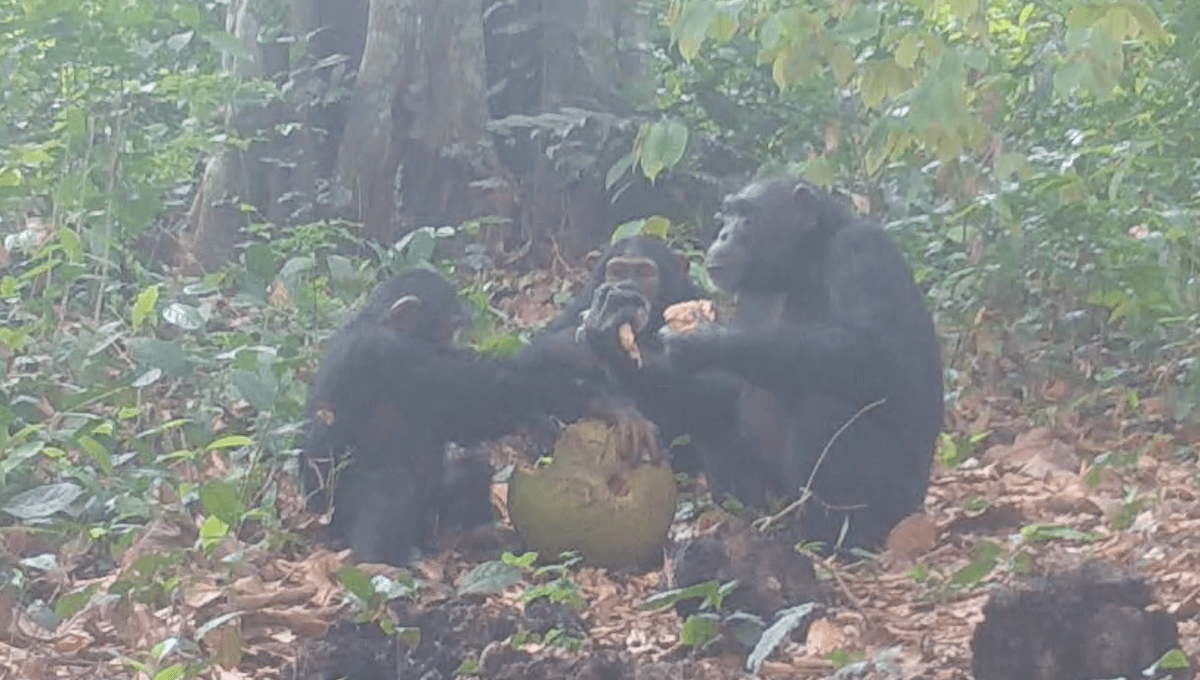
It isn’t just humans that have a taste for alcohol. Chimpanzees will search around in the jungle and hunt for fermented fruit, seemingly wanting to catch a buzz from the psychoactive effects of ethanol. In fact, new evidence suggests that our great ape cousins might also use alcohol as a social lubricant, just like Homo sapiens.
In a new study, scientists at the University of Exeter captured footage of wild chimps eating and passing around fermented African breadfruit in Guinea-Bissau’s Cantanhez National Park, West Africa.
The sharing of fermented fruits was seen on at least 10 separate occasions, raising questions about why the chimps actively seek out the booze-soaked food.
“Chimps don’t share food all the time, so this behaviour with fermented fruit might be important,” Dr Kimberley Hockings, study author from the Centre for Ecology and Conservation at the University of Exeter, said in a statement.
African breadfruit is rich in sugars and naturally undergoes fermentation under the right conditions, enriching it with up to 0.61 percent alcohol by volume (ABV). That’s relatively weak compared to the alcoholic drinks quaffed by humans – beer typically contains between 4 and 6 percent ABV – but it could be significant since chimps eat a lot of fruit.
The researchers stress that chimps are unlikely to get “drunk” on the fruit – being intoxicated in the jungle would definitely not bode well for survival. However, there’s a possibility they might consume just enough to “loosen” them up and make them more open to social bonding.
“For humans, we know that drinking alcohol leads to a release of dopamine and endorphins, and resulting feelings of happiness and relaxation,” explained Anna Bowland, lead study author from the Centre for Ecology and Conservation at the University of Exeter
“We also know that sharing alcohol – including through traditions such as feasting – helps to form and strengthen social bonds. So – now we know that wild chimpanzees are eating and sharing ethanolic fruits – the question is: could they be getting similar benefits?”
There’s compelling evidence that alcohol tolerance goes way back in our evolutionary story. Scientists have previously found that extinct hominin ancestors developed a genetic mutation that let them process ethanol more efficiently. This adaptation showed up around 10 million years ago, long before apes had any way of intentionally brewing alcohol.
One interesting idea, known as the drunken monkey hypothesis, suggests that early primates drawn to the smell of alcohol were better at finding ripe, energy-rich fruit. Ethanol, being a light and volatile compound, can easily evaporate and become airborne, allowing its scent to travel through the forest. Detecting this pong gave them a survival advantage, and over time, those alcohol-friendly genes were passed on.
It’s the same adaptation that allows humans to use (and abuse) alcohol today. For all its “sins,” alcohol has arguably played a role in the development of human culture by fueling parties, celebrations, and feasts that strengthen social bonds. As this new study suggests, we might still see the roots of that behavior in today’s chimpanzees.
“We need to find out more about whether they deliberately seek out ethanolic fruits and how they metabolise it, but this behaviour could be the early evolutionary stages of ‘feasting’. If so, it suggests the human tradition of feasting may have its origins deep in our evolutionary history,” added Hockings.
The study is published in the journal Current Biology.
Source Link: Chimps Filmed Sharing Booze In The Wild Shows Our Deep Evolutionary Taste For Alcohol